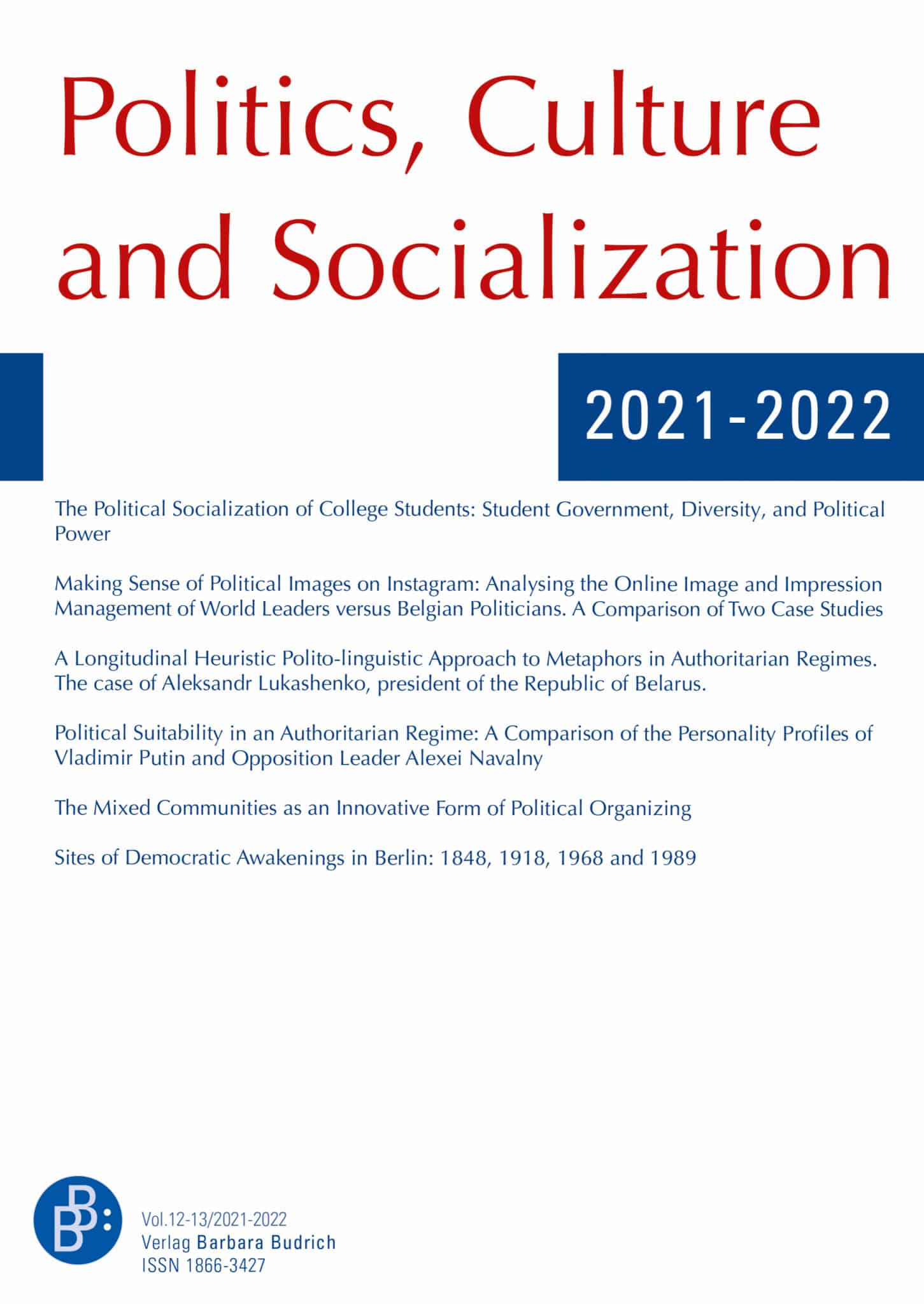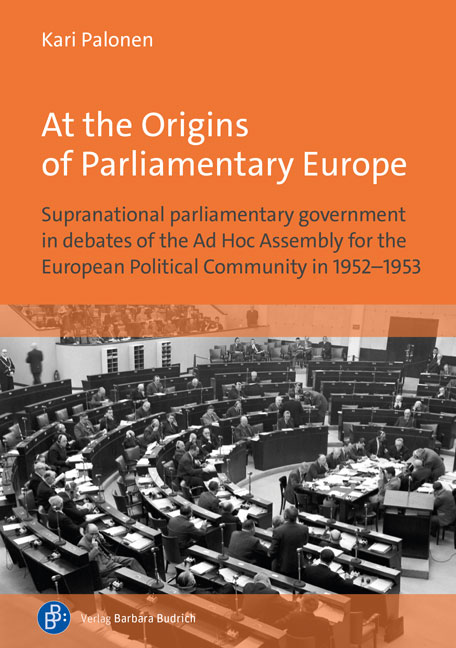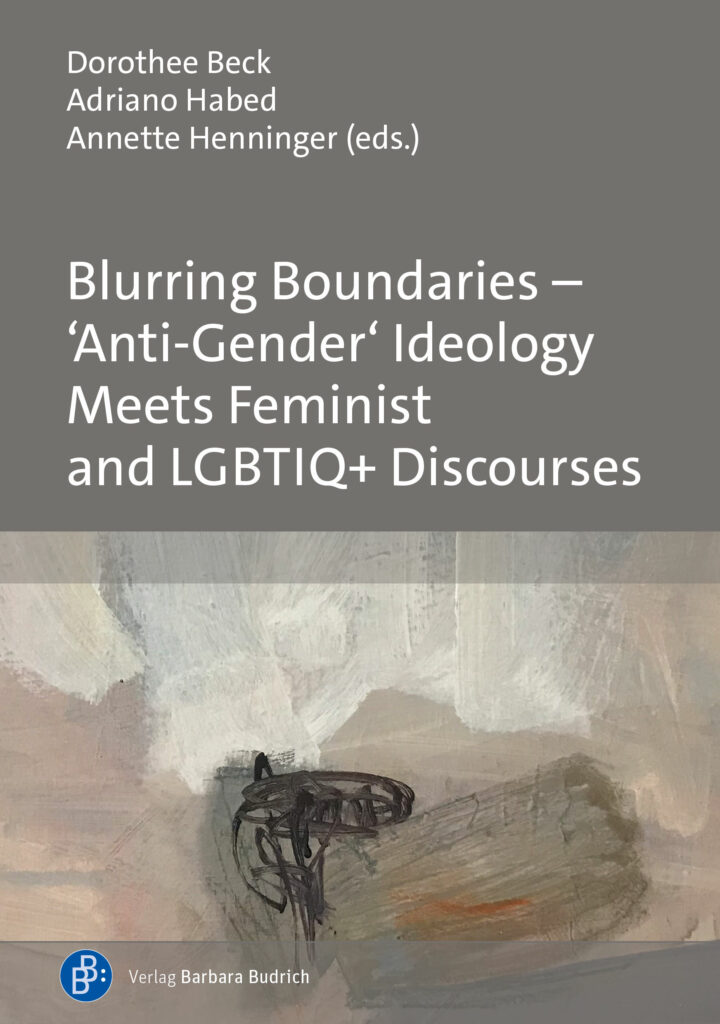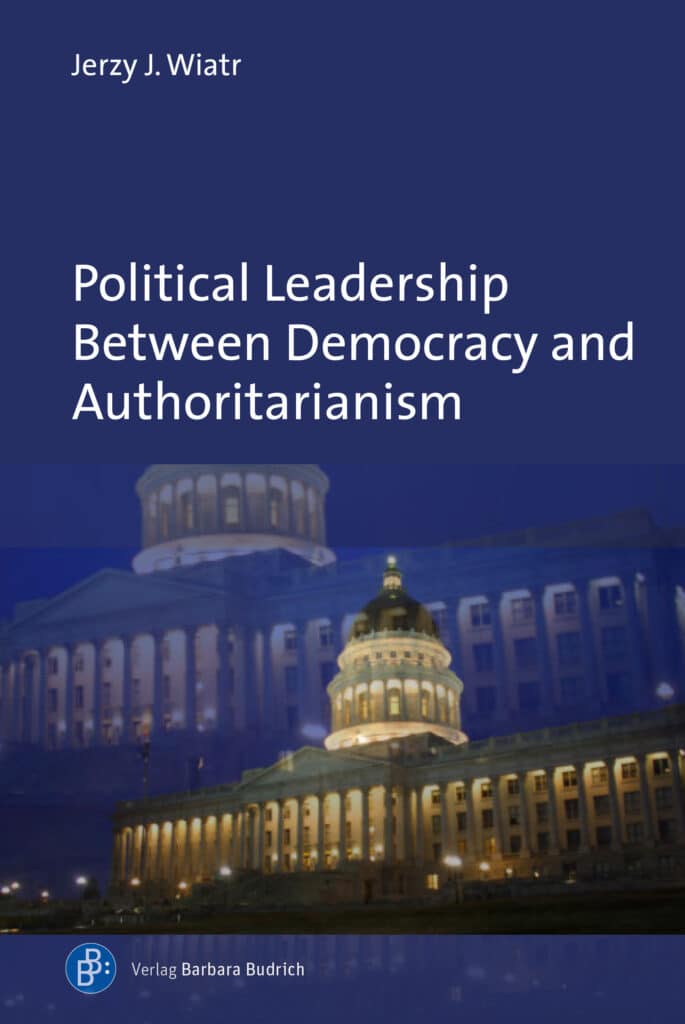Informationen zur Zeitschrift
Startseite » Programm » PCS 2021-2022 | Free Contributions
PCS 2021-2022 | Free Contributions
Erscheinungsdatum : 11.09.2024
84,00 €
- Inhalt
- Bibliografie
- Produktsicherheit
- Zusatzmaterial
- Bewertungen (0)
- Autor*innen
- Schlagwörter
- Abstracts
Inhalt
PCS – Politics, Culture and Socialization
2021-2022: Free Contributions
Articles 2021
Elizabeth S. Smith / Sabrina S. Roof / Katherine West / Nicole Hyman: The Political Socialization of College Students: Student Government, Diversity, and Political Power
Stéphanie De Munter / Sam Pinxteren: Making Sense of Political Images on Instagram: Analysing the Online Image and Impression Management of World Leaders versus Belgian Politicians. A Comparison of Two Case Studies
Solvita Denisa-Liepniece: A Longitudinal Heuristic Polito-linguistic Approach to Metaphors in Authoritarian Regimes. The case of Aleksandr Lukashenko, president of the Republic of Belarus
Book review
Bas Schueremans: Hot Contention, Cool Abstention: Positive Emotions and Protest Behavior During the Arab Spring. By Stephanie Dornschneider (2021)
Articles 2022
Anna Diedkova / Christ’l De Landtsheer: Political Suitability in an Authoritarian Regime: A Comparison of the Personality Profiles of Vladimir Putin and Opposition Leader Alexei Navalny
Carmit Fuchs-Abarbanel: The Mixed Communities as an Innovative Form of Political Organizing
Ingo Juchler: Sites of Democratic Awakenings in Berlin: 1848, 1918, 1968 and 1989
Book review
Max Runge: The Lonely Century: coming together in a world that’s pulling apart. By Noreena Hertz (2020)
Download of single articles (Open Access/fee-based): pcs.budrich-journals.com
You can register here for the PCS alert.
Einzelbeitrag-Download (Open Access/Gebühr): pcs.budrich-journals.com
Sie können sich hier für den PCS-Alert anmelden.
Zusätzliche Information
| Verlag | |
|---|---|
| ISSN | 1866-3427 |
| eISSN | 2196-1417 |
| Jahrgang | 12.+13. Jahrgang 2021-2022 |
| Ausgabe | 2021-2022 |
| Erscheinungsdatum | 11.09.2024 |
| Umfang | 156 Seiten |
| Sprache | Englisch |
| Format | 17 x 24 cm |
| DOI | |
| Homepage |
Zusatzmaterial
Table of Contents / Inhaltsverzeichnis
Extracts / Leseproben
Autor*innen
SchlagwörterBelarus, Berlin, college student government, Critical discourse analysis, democracy, Elections, Elites, impression management, Instagram, integration of different identities, Jewish communities, Lukashenko, metaphor analysis, mixed communities, modes of discourse, Navalny, personality assessment at a distance, Political communication, political marketing, political socialization, Putin, Russia, September 2024, sites of memory, social challenges, student leadership, visual analysis
Abstracts
The Political Socialization of College Students: Student Government, Diversity, and Political Power (Elizabeth S. Smith, Sabrina S. Roof, Katherine West and Nicole Hyman)
For over a century, institutions of higher education have had student government organizations on their campuses. We show these organizations serve as important socializing agents, providing opportunities to practice politics and exercise political voice. In this article, we present both quantitative and qualitative research conducted over the past two years on the top 50 universities and top 50 liberal arts colleges. We investigate the role of these organizations on their campuses, the level of their diversity in leadership, and the correlates of that diversity (type of school, geography, politics of the state legislature, etc.). Using surveys and in-depth interviews of student leaders, we find that student governments are influenced in many ways by the current politics of the day especially surrounding issues of diversity and inclusion, and that leadership opportunities socialize students to have the skills for and interest in future political officeholding. Keywords: political socialization, college student government, student leadership
» Buy Single Contribution (Budrich Journals) / Einzelbeitrag kaufen (Budrich Journals)
Making Sense of Political Images on Instagram: Analysing the Online Image and Impression Management of World Leaders versus Belgian Politicians. A Comparison of Two Case Studies (De Munter & Sam Pinxteren)
For the past decade, informality seems to be playing an increasing role in the branding strategies of politicians around the world. Ongoing individualization and privatization have encouraged candidates to share personal pictures of themselves on social media platforms, highlighting the human side behind the leader. Although visuals are omnipresent in digital media, little is known about how people interact and engage with the presented content. Perception politics and impression management techniques can help to create a favourable public persona (Diedkova, De Landtsheer & De Vries, 2019) – in this case through an Instagram post. Drawing on the perception politics management framework, which postulates that a more serious and formal presentation of a political candidate leads to higher support and an elevated perception of political suitability for candidates, it is assumed that the presence of formal attributes on a post has a positive effect on engagement. In order to explore voter’s perception of political suitability, a comprehensive visual analysis was repeated within two different geographical contexts: 1) Belgian politicians and parties and 2) world leaders. Data was collected via a real-time object detection program called You Only Look Once’ in the programming language Python. The results indicate that – though one might expect that political communication should adhere to the informal character of social media to garner more voter engagement – the image that resonates best with the voter is a formal one – similar to the pre-social media age. Keywords: Instagram; visual analysis; impression management; political communication; political marketing
» Buy Single Contribution (Budrich Journals) / Einzelbeitrag kaufen (Budrich Journals)
A Longitudinal Heuristic Polito-linguistic Approach to Metaphors in Authoritarian Regimes. The case of Aleksandr Lukashenko, president of the Republic of Belarus (Solvita Denisa‐Liepniece)
Despite the recent tendency to evaluate the power of facts and fact-checking, the power of emotions continues to attract researchers. While fact-checking is now actively addressed in public discourse, recent decades have witnessed a growing interest in understanding communication related factors that influence audiences. This article presents a new approach, entitled the Polito- linguistic Metaphor Approach, which is designed for the longitudinal study of metaphors, specifically those metaphors used in authoritarian regimes. This approach can contribute to detecting crises encountered by the regime. The approach integrates two self-sufficient research methods for analyzing metaphors and one approach for studying political discourse in political rhetoric. Both quantitative and qualitative research methods are incorporated in this new method for studying metaphors in authoritarian political discourse. The research methodology of the Polito- linguistic analysis for the metaphors of an authoritarian leader is applied in this article to the (2004-2011) ritualistic political rhetoric by Aleksandr Lukashenko, president of Belarus. Keywords: Belarus, Lukashenko, metaphor analysis, critical discourse analysis
» Buy Single Contribution (Budrich Journals) / Einzelbeitrag kaufen (Budrich Journals)
Political Suitability in an Authoritarian Regime: A Comparison of the Personality Profiles of Vladimir Putin and Opposition Leader Alexei Navalny (Anna Diedkova and Christ’l De Landtsheer)
Studies in political psychology have linked the personality characteristics of leaders to political success, specifically regarding electoral results and leadership effectiveness in democracies. This article expands this literature by exploring the relationship between personality and political career in an electoral authoritarian regime. This research focuses on the psychological profiles of the Russian president Vladimir Putin and Alexei Navalny–one of his most prominent critics. We compare the personalities of two political rivals with unequal access to the political arena, employing at-a-distance assessment. Why is then the case that Putin seems to fear the rise of Navalny more than the communist party contestants, after all? The results indicate that if not for the regime restrictions, Navalny’s personality profile and leadership style would be instrumental for his political career. The findings emphasize the need to differentiate between distinctive environment attributes (context of marginalized opposition and ruling elite) within the general context of an authoritarian regime when studying the value of certain personality patterns for leadership emergence. Keywords: elites, elections, personality assessment at a distance, Russia, Putin, Navalny
» Buy Single Contribution (Budrich Journals) / Einzelbeitrag kaufen (Budrich Journals)
The Mixed Communities as an Innovative Form of Political Organizing (Carmit Fuchs‐Abarbanel)
The research examined Jewish communities with a new sociopolitical pattern: secular, religious, and traditional members. Researchers generally view Israeli society as composed of divides and groups educational systems and political parties, with a predominant secular-religious divide in Jewish society. Mixed communities counter separatism and segregation. Their development has implications for future national social processes. Their political pattern encourages social discourse promoting communityness, handles social challenges dynamically, confronting social and political dilemmas. An inclusive educational system exemplifies this (secular, religious, and traditional students attending the same school. The new discourse offers a model for a fresh Israeli sociopolitical ideal. The communities explore questions impacting individuals and wider society. These innovations originated in ties between individuals and between population groups: unprecedented in Israeli society, they are gaining momentum and success. Keywords: mixed communities, social challenges, Jewish communities, integration of different identities, modes of discourse
» Buy Single Contribution (Budrich Journals) / Einzelbeitrag kaufen (Budrich Journals)
Sites of Democratic Awakenings in Berlin: 1848, 1918, 1968 and 1989 (Ingo Juchler)
Like no other city in Germany, Berlin’s urban landscape offers a boasts a myriad of historical sites of memory in the form of commemorative plaques, memorial and documentation sites, such as the Topography of Terror, Stolpersteine, the history mile on Wilhelmstraße or remnants of the Berlin Wall. Yet in Germany’s dealing with its own past, there is also widespread evidence of historical amnesia. This loss of historical-political memory of democratic achievements is particularly obvious in articulations of authoritarian, and often times anti-democratic, positions in the political arena. To be sure, the historical forgetting of democratic traditions has adverse effects on current political discourse. Sites of memory not only make it possible to visualize previous democratic processes, but also offer an opportunity to critically reflect on one’s own political experiences. Learning can take place in the actual, physical places where people took a stand for freedom and democracy. Furthermore, through a shift in perspective the various motives of the historical actors can be perceived and evaluated in a new way. The democratic upheavals of 1848, 1918, 1968, and 1989 are among the historical events that have decisively shaped democracy in Germany today. Indeed, they also occurred in a European context, and in the case of 1968, a global one. Across Berlin’s urban landscape there are places that mark these key historical moments. This article examines these historical upheavals as constitutive lines of a democratic tradition and presents the places of remembrance still visible in Berlin and presents the places where they took place. Keywords: democracy, sites of memory, Berlin: 1848, 1918, 1968 and 1989
» Buy Single Contribution (Budrich Journals) / Einzelbeitrag kaufen (Budrich Journals)
Inhalt
Inhalt
PCS – Politics, Culture and Socialization
2021-2022: Free Contributions
Articles 2021
Elizabeth S. Smith / Sabrina S. Roof / Katherine West / Nicole Hyman: The Political Socialization of College Students: Student Government, Diversity, and Political Power
Stéphanie De Munter / Sam Pinxteren: Making Sense of Political Images on Instagram: Analysing the Online Image and Impression Management of World Leaders versus Belgian Politicians. A Comparison of Two Case Studies
Solvita Denisa-Liepniece: A Longitudinal Heuristic Polito-linguistic Approach to Metaphors in Authoritarian Regimes. The case of Aleksandr Lukashenko, president of the Republic of Belarus
Book review
Bas Schueremans: Hot Contention, Cool Abstention: Positive Emotions and Protest Behavior During the Arab Spring. By Stephanie Dornschneider (2021)
Articles 2022
Anna Diedkova / Christ’l De Landtsheer: Political Suitability in an Authoritarian Regime: A Comparison of the Personality Profiles of Vladimir Putin and Opposition Leader Alexei Navalny
Carmit Fuchs-Abarbanel: The Mixed Communities as an Innovative Form of Political Organizing
Ingo Juchler: Sites of Democratic Awakenings in Berlin: 1848, 1918, 1968 and 1989
Book review
Max Runge: The Lonely Century: coming together in a world that’s pulling apart. By Noreena Hertz (2020)
Download of single articles (Open Access/fee-based): pcs.budrich-journals.com
You can register here for the PCS alert.
Einzelbeitrag-Download (Open Access/Gebühr): pcs.budrich-journals.com
Sie können sich hier für den PCS-Alert anmelden.
Bibliografie
Zusätzliche Information
| Verlag | |
|---|---|
| ISSN | 1866-3427 |
| eISSN | 2196-1417 |
| Jahrgang | 12.+13. Jahrgang 2021-2022 |
| Ausgabe | 2021-2022 |
| Erscheinungsdatum | 11.09.2024 |
| Umfang | 156 Seiten |
| Sprache | Englisch |
| Format | 17 x 24 cm |
| DOI | |
| Homepage |
Produktsicherheit
Zusatzmaterial
Zusatzmaterial
Table of Contents / Inhaltsverzeichnis
Extracts / Leseproben
Bewertungen (0)
Bewertungen
Es gibt noch keine Bewertungen.
Autor*innen
Autor*innen
Schlagwörter
SchlagwörterBelarus, Berlin, college student government, Critical discourse analysis, democracy, Elections, Elites, impression management, Instagram, integration of different identities, Jewish communities, Lukashenko, metaphor analysis, mixed communities, modes of discourse, Navalny, personality assessment at a distance, Political communication, political marketing, political socialization, Putin, Russia, September 2024, sites of memory, social challenges, student leadership, visual analysis
Abstracts
Abstracts
The Political Socialization of College Students: Student Government, Diversity, and Political Power (Elizabeth S. Smith, Sabrina S. Roof, Katherine West and Nicole Hyman)
For over a century, institutions of higher education have had student government organizations on their campuses. We show these organizations serve as important socializing agents, providing opportunities to practice politics and exercise political voice. In this article, we present both quantitative and qualitative research conducted over the past two years on the top 50 universities and top 50 liberal arts colleges. We investigate the role of these organizations on their campuses, the level of their diversity in leadership, and the correlates of that diversity (type of school, geography, politics of the state legislature, etc.). Using surveys and in-depth interviews of student leaders, we find that student governments are influenced in many ways by the current politics of the day especially surrounding issues of diversity and inclusion, and that leadership opportunities socialize students to have the skills for and interest in future political officeholding. Keywords: political socialization, college student government, student leadership
» Buy Single Contribution (Budrich Journals) / Einzelbeitrag kaufen (Budrich Journals)
Making Sense of Political Images on Instagram: Analysing the Online Image and Impression Management of World Leaders versus Belgian Politicians. A Comparison of Two Case Studies (De Munter & Sam Pinxteren)
For the past decade, informality seems to be playing an increasing role in the branding strategies of politicians around the world. Ongoing individualization and privatization have encouraged candidates to share personal pictures of themselves on social media platforms, highlighting the human side behind the leader. Although visuals are omnipresent in digital media, little is known about how people interact and engage with the presented content. Perception politics and impression management techniques can help to create a favourable public persona (Diedkova, De Landtsheer & De Vries, 2019) – in this case through an Instagram post. Drawing on the perception politics management framework, which postulates that a more serious and formal presentation of a political candidate leads to higher support and an elevated perception of political suitability for candidates, it is assumed that the presence of formal attributes on a post has a positive effect on engagement. In order to explore voter’s perception of political suitability, a comprehensive visual analysis was repeated within two different geographical contexts: 1) Belgian politicians and parties and 2) world leaders. Data was collected via a real-time object detection program called You Only Look Once’ in the programming language Python. The results indicate that – though one might expect that political communication should adhere to the informal character of social media to garner more voter engagement – the image that resonates best with the voter is a formal one – similar to the pre-social media age. Keywords: Instagram; visual analysis; impression management; political communication; political marketing
» Buy Single Contribution (Budrich Journals) / Einzelbeitrag kaufen (Budrich Journals)
A Longitudinal Heuristic Polito-linguistic Approach to Metaphors in Authoritarian Regimes. The case of Aleksandr Lukashenko, president of the Republic of Belarus (Solvita Denisa‐Liepniece)
Despite the recent tendency to evaluate the power of facts and fact-checking, the power of emotions continues to attract researchers. While fact-checking is now actively addressed in public discourse, recent decades have witnessed a growing interest in understanding communication related factors that influence audiences. This article presents a new approach, entitled the Polito- linguistic Metaphor Approach, which is designed for the longitudinal study of metaphors, specifically those metaphors used in authoritarian regimes. This approach can contribute to detecting crises encountered by the regime. The approach integrates two self-sufficient research methods for analyzing metaphors and one approach for studying political discourse in political rhetoric. Both quantitative and qualitative research methods are incorporated in this new method for studying metaphors in authoritarian political discourse. The research methodology of the Polito- linguistic analysis for the metaphors of an authoritarian leader is applied in this article to the (2004-2011) ritualistic political rhetoric by Aleksandr Lukashenko, president of Belarus. Keywords: Belarus, Lukashenko, metaphor analysis, critical discourse analysis
» Buy Single Contribution (Budrich Journals) / Einzelbeitrag kaufen (Budrich Journals)
Political Suitability in an Authoritarian Regime: A Comparison of the Personality Profiles of Vladimir Putin and Opposition Leader Alexei Navalny (Anna Diedkova and Christ’l De Landtsheer)
Studies in political psychology have linked the personality characteristics of leaders to political success, specifically regarding electoral results and leadership effectiveness in democracies. This article expands this literature by exploring the relationship between personality and political career in an electoral authoritarian regime. This research focuses on the psychological profiles of the Russian president Vladimir Putin and Alexei Navalny–one of his most prominent critics. We compare the personalities of two political rivals with unequal access to the political arena, employing at-a-distance assessment. Why is then the case that Putin seems to fear the rise of Navalny more than the communist party contestants, after all? The results indicate that if not for the regime restrictions, Navalny’s personality profile and leadership style would be instrumental for his political career. The findings emphasize the need to differentiate between distinctive environment attributes (context of marginalized opposition and ruling elite) within the general context of an authoritarian regime when studying the value of certain personality patterns for leadership emergence. Keywords: elites, elections, personality assessment at a distance, Russia, Putin, Navalny
» Buy Single Contribution (Budrich Journals) / Einzelbeitrag kaufen (Budrich Journals)
The Mixed Communities as an Innovative Form of Political Organizing (Carmit Fuchs‐Abarbanel)
The research examined Jewish communities with a new sociopolitical pattern: secular, religious, and traditional members. Researchers generally view Israeli society as composed of divides and groups educational systems and political parties, with a predominant secular-religious divide in Jewish society. Mixed communities counter separatism and segregation. Their development has implications for future national social processes. Their political pattern encourages social discourse promoting communityness, handles social challenges dynamically, confronting social and political dilemmas. An inclusive educational system exemplifies this (secular, religious, and traditional students attending the same school. The new discourse offers a model for a fresh Israeli sociopolitical ideal. The communities explore questions impacting individuals and wider society. These innovations originated in ties between individuals and between population groups: unprecedented in Israeli society, they are gaining momentum and success. Keywords: mixed communities, social challenges, Jewish communities, integration of different identities, modes of discourse
» Buy Single Contribution (Budrich Journals) / Einzelbeitrag kaufen (Budrich Journals)
Sites of Democratic Awakenings in Berlin: 1848, 1918, 1968 and 1989 (Ingo Juchler)
Like no other city in Germany, Berlin’s urban landscape offers a boasts a myriad of historical sites of memory in the form of commemorative plaques, memorial and documentation sites, such as the Topography of Terror, Stolpersteine, the history mile on Wilhelmstraße or remnants of the Berlin Wall. Yet in Germany’s dealing with its own past, there is also widespread evidence of historical amnesia. This loss of historical-political memory of democratic achievements is particularly obvious in articulations of authoritarian, and often times anti-democratic, positions in the political arena. To be sure, the historical forgetting of democratic traditions has adverse effects on current political discourse. Sites of memory not only make it possible to visualize previous democratic processes, but also offer an opportunity to critically reflect on one’s own political experiences. Learning can take place in the actual, physical places where people took a stand for freedom and democracy. Furthermore, through a shift in perspective the various motives of the historical actors can be perceived and evaluated in a new way. The democratic upheavals of 1848, 1918, 1968, and 1989 are among the historical events that have decisively shaped democracy in Germany today. Indeed, they also occurred in a European context, and in the case of 1968, a global one. Across Berlin’s urban landscape there are places that mark these key historical moments. This article examines these historical upheavals as constitutive lines of a democratic tradition and presents the places of remembrance still visible in Berlin and presents the places where they took place. Keywords: democracy, sites of memory, Berlin: 1848, 1918, 1968 and 1989
» Buy Single Contribution (Budrich Journals) / Einzelbeitrag kaufen (Budrich Journals)









Bewertungen
Es gibt noch keine Bewertungen.